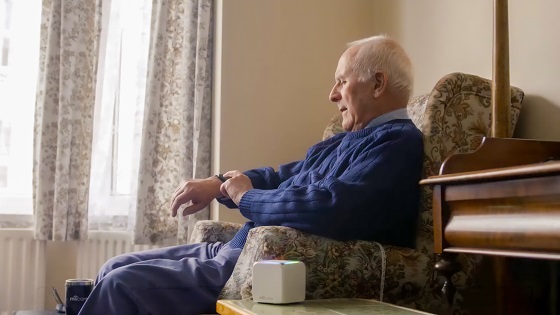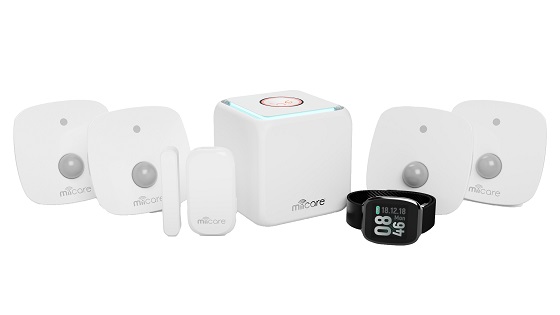It sounds like the stuff of science fiction but an artificial intelligence assistant called Monica, which chats with elderly patients and monitors their progress after being discharged from hospital, is being developed with the help of De Montfort University Leicester researchers.
The joint research project by DMU's Centre for Primary Care Research, AI experts MiiCare and Connected Places Catapult, is developing, testing and assessing additional capabilities in Monica - a voice-based virtual assistant and digital companion - to see if she can speed up the move from hospital to home for older people, and help prevent unnecessary re-admissions.

Monica is currently designed to use the patient's voice and the tracking of their footsteps to:
- Evaluate the mental health of the patient and detect possible signs of low mood or confusion
- Trigger alerts to care providers to carry out urgent physical assessments if features of delirium are detected
- Monitor changes in the patient's voice patterns to identify possible signs of respiratory tract infections
- Track physical activity as well as detecting changes in walking patterns that might point towards health problems or increased risk of falls.
The research, called the D2A Smart Incubator project, has received funding from UK Research and Innovation (UKRI) - a national funding body supported by the Government's Department for Science, Innovation and Technology.
As part of this research,Monica's AI capabilities are being developed to potentially minimise the delays older people face when leaving hospital and returning home.
Researchers say the delays to being discharged from hospital are due to frail older adults being susceptible to greater physical decline with even relatively minor illnesses, changes in medication and a change in where they are staying.
Assessments have to be carried out to put the right care packages in place in order for the patient to be discharged.
It is estimated a third of all hospital delays are caused by elderly patients waiting for a care package, meaning beds cannot be freed up for other patients. It is estimated the delays cost the NHS more than £250 million a year.
It is also known that extended stays in hospitals can increase risks of hospital acquired infections, delirium and a decline in mental health and confidence which could lead to longer stays or re-admissions.

Some of the Monica equipment used in the home
Kelvin Summoogum, Founder & CEO of MiiCare, said: "Political leaders of all stripes and persuasions made great strides during the pandemic to protect the NHS's critical services.
"However, with the rise in chronic conditions and rapid increase in the number of vacant posts in the health sector, commissioners need to turn to new models of technology-enabled care.
"As part of this project, MiiCare is delighted to be leading best-of-breed AI experts, clinicians and researchers to deliver an innovative solution.
"Over the next 24 months, we will work tirelessly to deliver on our promises and demonstrate the efficacy of our proposed solution in creating capacity within hospital wards and preventing the deterioration of patients' health."
De Montfort University's Professor Bertha Ochieng, Director of the Centre for Primary Care Research, is university lead for the project - a joint initiative with geriatric care provider Willows Health.
She said: "We are delighted to partner on this exciting research project to support older adults leaving hospital and continue their care and assessment in their homes.
"The project allows the university and research partners to engage with and examine ways of reducing delays in hospitals which would ultimately lead to improved experiences for some of the most vulnerable people in our communities."
Ophir Levy, Co-Founder & CTO, MiiCare, and D2A project manager, said: "We are excited to lead this innovative collaborative project with our partners, where we aim to further develop our novel solution - building on our AI-based digital health coach Monica - for supporting not just the individual patients but the NHS and health care system as a whole, by reducing re-admissions, releasing hospital beds earlier and shaping the future of care provision".
Dr Rachna Leveque, Senior Housing Innovation Lead at Connected Places Catapult, said: "We are pleased to bring our user-experience, strategic market assessment and stakeholder engagement experience to this consortium to develop a product that is strongly aligned with the needs of stakeholders within the NHS Discharge to Assess process.
"Monica currently provides a capable platform to support older adults in the home, and it is exciting to develop the offer to meet the needs of patients on the D2A pathway, as well as clinicians and care providers."
Dr Richard Wong, consultant geriatrician, Willows Health, and lead clinician on the D2A project said:
"This is an exciting partnership opportunity to utilise the rich resource of industry, design experts and academia in trying to solve what is arguably one of the biggest healthcare challenges we face with an ageing population.
"It takes the application of technology to a new level and on a new scale for health and social care.
"This is not just of interest to health service planners, economists and clinicians but promises to be of tangible benefit at the individual level, through earlier detection of ill-health and providing a greater in-depth insight into daily routines and care needs."
Conversations between Monica and the patient will lead to a comprehensive digital record of the patient's overall well-being.
A range of different accessories are available to pair with Monica as required and enable monitoring of basic health measures, medication compliance and activity levels.
Project members say this will lead to a better understanding of the patient's condition while at home, quicker treatment, an increase in the proportion of patients not being re-admitted back to the hospital within 30-days of being discharged and reduced costs to the NHS and local authority social care providers.
Posted on Monday 15 January 2024